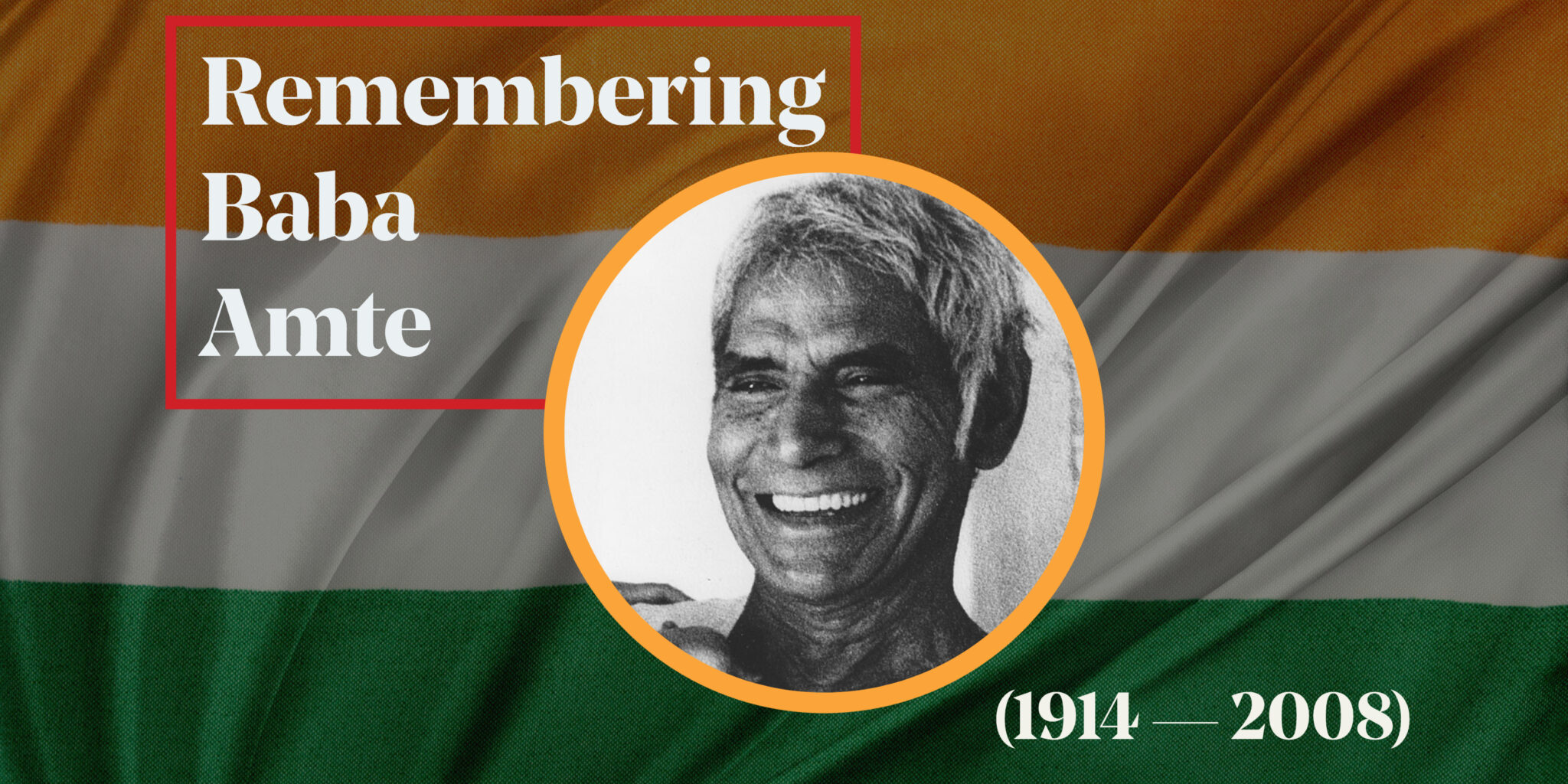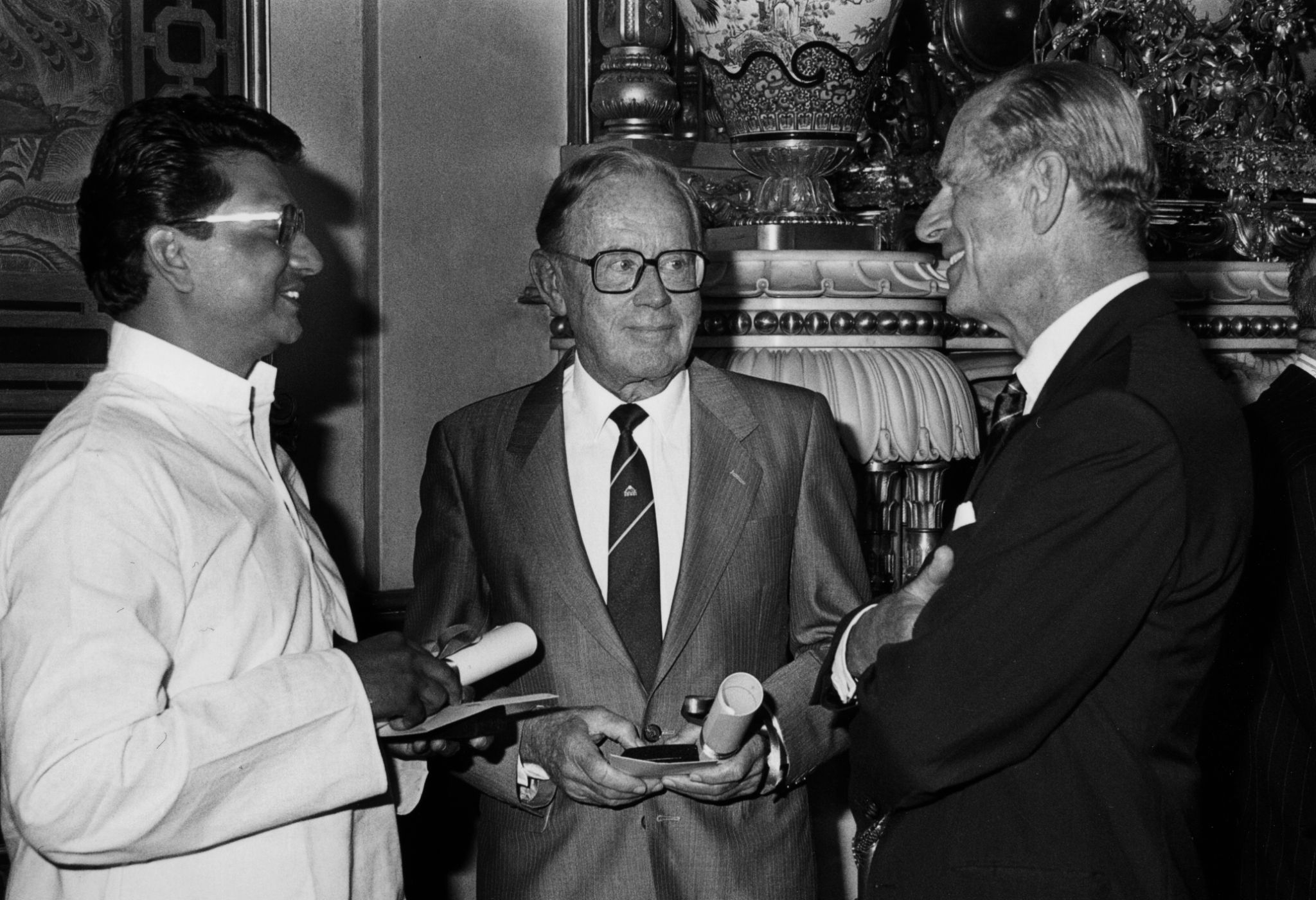Baba Amte was born one of India’s most fortunate sons. He grew up in a wealthy, landowning Braham family and ultimately achieved a comfortable career as a lawyer.
But Amte could not ignore the suffering he saw in his country.
A strong personal calling eventually compelled him to abandon his upper class lifestyle and seek out the poor and the destitute, specifically those afflicted with leprosy. Amte listened with outrage to the stories of their plight and mistreatment, and in 1949, he founded Anandwan — an ashram dedicated to the treatment and empowerment of leprosy patients.
In 1990, Baba Amte was awarded the Templeton Prize for his lifelong philanthropic work with lepers and his commitment to religious and spiritual enlightenment. His acceptance address, delivered by his son Dr. Vikas Amte at the Guildhall in London, is a testament to Amte’s boundless compassion for all living beings — plant, animal, and human — as well as his deep commitment to spiritual progress.
-

Baba Amte and L. Charles Birch 1990 Laureates of the Templeton Prize receiving award from Prince Philip, Duke of Edinburgh.
Today, we remember Baba Amte — who died on February 9, 2008 — by reflecting on the message of compassion and hope delivered in his Templeton Prize acceptance speech. His words carry as much weight today as they did more than three decades ago.
“At Anandwan, the place where I have lived for the past 40 years, we have in our midst, a memorial to an anonymous tree. As I lie down in my Fowler’s bed, I listen to the whisperings from its grave: “I have experienced the drowsiness of every autumn and the passions of every spring, hence I do not seek dust in shame and loneliness. Why do you?”
The tree speaks to all who despair and sends the message of renewal. When a tree sheds its leaves, the uninformed mourn the death of leaves, the knowing celebrate the birth of living humans. When I consider the young, I cannot but think of them as new leaves, emerging from the nutrients of the leaf that litter the forest floor. They are the future.
From Anandwan I bring to all of you a message of hope. A hope that springs from a life-long journey in search of Man. An odyssey rooted in one of the world’s most ancient spiritual traditions. A tradition which like so many others seems enveloped today by the forces of darkness. And yet its essential teachings every moment shatter the darkness and shine through radiant, like the rays of the sun.
Work is worship, work as worship. Work which is not a source of bondage; work which is the path to liberation, Nishkama Karmayoga. A path on which the self is completely submerged and work stems from the urge of Lokasamgraham – the creation of a world order which is just and sustainable, for the good of all. Work as a yoga – as total dedication, concentration, meditation.
Meditation upon the all-pervading, primeval, eternal Source, the Source of the everlasting flow of the cosmic energy of goodness. Work founded in shraddha, total faith and inspiration; work inspired by karuna, the unbounded bounty of compassion that moved Tathagatha, who refused salvation, so as to be born again and again till all living beings attain liberation.
A suffering Servant brought a new down in my life. He commanded me to go out and help in the most personal way. The tired and bewildered, the poor and lonely. Like blood in a new wound He ordered me to rush to erase pain and provide the touch of healing. The greatest ananda (joy) comes in life when you invest yourself in others. Candihijim, Sane, Guruji and Vinoba came in my life. They all had a shining sense of moral purpose. They all believe that the death of their atma, their soul, their conscience was darker than the loss of their lives.
At Anandwan we, outcasts living with outcasts, have built a world which embraces all who wish to come and join. A world where you do not stand alone, where you belong to others who belong to you. A community of compassion. Where charity is non-existent, where creativity and building flourish. Where those rejected by an unconcerned and uncomprehending world, realise their own worth with their own hands. Self-respecting and self-sufficient. Creators of a new world of joy, and Awandwan, which holds forth the light of hope for the world outside.
A life of spiritual striving is a journey, a journey of discovery, of rediscovery – a return to the Eternal Truth. A realisation of the essential unity of all God’s creations, of their delicate balance and harmony. But each journey is also a renewal, defined by the particular form, the particular context in which this return takes place. By its colour, its texture, its medium.”
— Baba Amte, 1990. Read the full speech.

